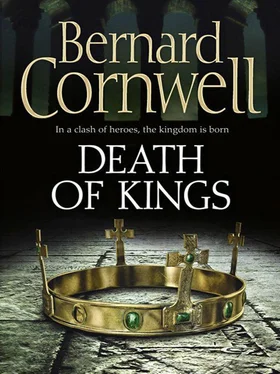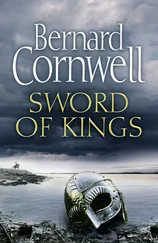I carried Lightning’s body to some nearby trees and I used the knife and a shard of stone to make a grave. I laid the hound inside, put the knife beside him, then wished him happy hunting in the next world. I filled in the grave and heaped rocks over it to preserve his body from the carrion-eaters. It was almost dawn by the time I had finished and I was dirty, blood-soaked and miserable.
‘Dear God, what happened?’ Father Cuthbert stared aghast at me.
‘I prayed to Thor,’ I said curtly.
‘The dog?’ he whispered the question.
‘Is hunting in the next world,’ I said.
He shuddered. Some priests would have chided me for sacrificing to false gods, but Cuthbert just made the sign of the cross. ‘The spirits have been quiet,’ he told me.
‘So one of the prayers worked,’ I said, ‘either yours or mine.’
‘Or both, lord,’ he said.
And when the sun rose the slaves came and I had them open the tomb and then move the dead from one of the two deeper chambers. They piled the bones in the opposite chamber, and then we sealed that corpse-crowded space with a slab of rock. We put skulls in the two cavities nearest the entrance, so that any visitor, stooping into the passageway, would be greeted by the grinning dead. The hardest work was disguising the entrance of the northernmost chamber, the one we had cleared of bones, because Ludda needed to be able to get in and out of that artificial cave. Father Cuthbert found the solution. His father had taught him the stonemason’s trade, and Cuthbert clumsily chipped away at a limestone slab until it resembled a thin shield. It took him two days, but he managed it and we balanced the thin slab on a flat rock and Ludda found he could tip it easily enough. He could pull it outwards, crawl past it into the chamber and then another man could push it back upright so that Ludda was hidden behind the shield-like slab. When he spoke from behind the slab his voice was muffled, but audible.
We sealed the grave again, piling earth over the entrance boulder and then went back to Fagranforda. ‘Now we go to Lundene,’ I told Ludda. ‘You, me and Finan.’
‘Lundene!’ He liked that. ‘Why are we going, lord?’
‘To find two whores, of course.’
‘Of course,’ he said.
‘I can help!’ Father Cuthbert said eagerly.
‘I thought I’d make you responsible for collecting the goose feathers,’ I told Cuthbert.
‘Goose feathers?’ He stared at me, appalled. ‘Oh, lord, please!’
Whores and goose feathers. Plegmund was praying for peace and I was planning for war.
I took thirty men to Lundene, not because I needed them, but because a lord should travel in style. We found quarters for men and horses in the Roman fort that guarded the old city’s north-western corner, then I walked with Finan and Weohstan along the remnants of the Roman wall. ‘When you commanded here,’ Weohstan asked, ‘did they starve you of money?’
‘No,’ I said.
‘I have to beg for every coin,’ he grumbled. ‘They’re building churches, but I can’t persuade them to repair the wall.’
And the wall needed repair more than ever. A great stretch of the Roman battlements between the Bishop’s Gate and the Old Gate had fallen into the stinking ditch beyond. It was not a new problem. Back when I had been commander of the garrison, I had filled the gap with a massive oak palisade, but those trunks were dark now and some of them were rotting. King Eohric had seen this decayed stretch and I did not doubt he had noted it, and after his visit to Lundene I had suggested that repairs be made urgently, but nothing had been done. ‘Just look,’ Weohstan said, and scrambled awkwardly down the slope of rubble that marked the ruined wall’s end. He pushed on an oak trunk and I saw it move like a dead tooth. ‘They won’t pay to replace them,’ Weohstan said gloomily. He kicked the base of the trunk and soft dark lumps of fungus-ridden wood exploded from his boot.
‘We’re at peace,’ I said sarcastically, ‘hadn’t you heard?’
‘Tell that to Eohric,’ Weohstan said, climbing back to join me. All the land to the north-east was Eohric’s land, and Weohstan told of Danish patrols coming close to the city. ‘They’re watching us,’ he said, ‘and all I’m allowed to do is wave at them.’
‘They don’t need to come close,’ I said, ‘their traders will have told them everything they want to know.’ Lundene was always busy with traders, Danish, Saxon, Frankish and Frisian, and such merchants carried news back to their homelands. Eohric, I was certain, knew just how vulnerable Lundene’s defences were, indeed he had seen them for himself. ‘But Eohric’s a cautious bastard,’ I said.
‘Sigurd isn’t.’
‘He’s still sick.’
‘Pray God he dies,’ Weohstan said savagely.
I learned more news in the city’s taverns. There were shipmasters from the whole coast of Britain who, for the price of an ale, offered rumours, some of them true. And not one rumour spoke of war. Æthelwold was still sheltered in Eoferwic, and still claimed to be King of Wessex, but he had no power until the Danes gave him an army. Why were they so quiet? It puzzled me. I had been so confident they would attack at the news of Alfred’s death, but instead they did nothing. Bishop Erkenwald knew the answer. ‘It’s God’s will,’ he told me. We had met by chance in a street. ‘God commanded us to love our enemies,’ he explained, ‘and by love we shall make them Christian and peaceable.’
I remember staring at him. ‘Do you really believe that?’ I asked.
‘We must have faith,’ he said fiercely. He made the sign of the cross towards a woman who had curtseyed to him. ‘So,’ he asked me, ‘what brings you to Lundene?’
‘We’re looking for whores,’ I said. He blinked. ‘Do you know any good ones, bishop?’ I asked.
‘Oh, dear God,’ he hissed, and went on his way.
In truth I had decided against finding whores in Lundene’s taverns because there was always a chance that the girls might be recognised, and so I led Finan, Ludda and Father Cuthbert down to the slave dock that lay upriver of the old Roman bridge. Lundene had never possessed a thriving slave market, but there was always some small trade in young folk captured from Ireland or Wales or Scotland. The Danes kept more slaves than the Saxons, and those that we did possess were usually farm labourers. A man who cannot afford an ox could harness a pair of slaves to a plough, though the furrow would never be as deep as that made by an ox-drawn blade. Oxen were less trouble too, though in the old days a man could kill a slave who proved a nuisance, and face no penalty. Alfred’s laws changed that. And many men liked to release their slaves, believing it earned them God’s approval, and so there was no great demand in Lundene, though there were usually a few slaves for sale at the dock beside the Temes. The traders came from Ratumacos, a town in Frankia, and almost all those traders were Northmen because the Viking crews had conquered all the region about that town. They came to buy the young folk captured in our border skirmishes, and some also brought slaves to sell, knowing that the wealthy men of Wessex and Mercia appreciated an exotic girl. The church frowned on that trade, but it thrived anyway.
The wharf lay not far beyond the river wall and the slaves were kept in dank wooden huts inside the wall. There were four traders in Lundene that day and their guards saw us coming and warned their masters that rich men were approaching. The traders came into the street and bowed low. ‘Wine, my lords?’ one asked. ‘Ale, perhaps? Or whatever your lordships desire.’
‘Women,’ Father Cuthbert said.
‘Be quiet,’ I growled at him.
‘Jesus and Joseph,’ Finan said under his breath and I knew he was remembering the long months he and I had spent as slaves, chained to Sverri’s oars, our arms branded with the S of slavery. Sverri had died, as had his henchman, Hakka, both slaughtered by Finan, but the Irishman had never lost his hatred of slavers.
Читать дальше
Конец ознакомительного отрывка
Купить книгу












